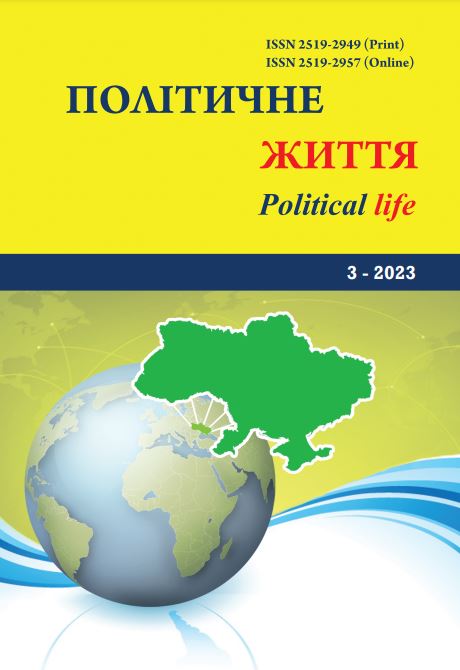Specifics of the use of information technologies in the formation of public opinion in modern Ukraine
DOI:
https://doi.org/10.31558/2519-2949.2023.3.10Keywords:
information technologies; public opinion; manipulation; President of Ukraine; Russian-Ukrainian war; social networks; digital resources; InternetAbstract
In the article, the author made an attempt to reveal the specifics of the use of information technologies by modern Ukrainian politicians in the processes of shaping public opinion. It is determined that the rapid development of information technology has opened up completely new ways of forming public opinion and led to the emergence of previously unknown forms of its demonstration through the same technologies. The main ways of influencing public opinion with the help of IT include: expressing public opinion through value judgments, for example, in online surveys; expressing public opinion through social behavior on the Internet; expressing public opinion through value judgments on the Internet; expressing public opinion through various user activities. At the same time, it is emphasized that the use of the spectrum of information technologies to influence public opinion is accompanied by various manipulation techniques used by political journalism and implemented through information resources.
It has been established that in Ukraine, the use of information technology in the process of forming public opinion has been developing in recent decades. A real leap in the use of information technology can be observed with the coming to power of Volodymyr Zelenskyy. Volodymyr Zelenskyy's team used unconventional methods in the election campaign, and also relied on the use of social media. The 2019 presidential election in Ukraine brought many innovations to Ukrainian politics, including the possibility of actively involving information technology in the election race. It is noted that for the first time in the history of the media space, there is not only the formation of public opinion by the authorities, but also a sense of feedback from Ukrainian society. The author notes that 2022 was a year of real consolidation due to the creation of a wide network of new information resources based on modern IT. In the first months of the war, social media, in particular, acted as a united front not only to inform but also to unite the Ukrainian nation.
References
Довгань О. Система інформаційної безпеки України: онтологічні виміри / О.Д. Довгань, Т.Ю. Ткачук // Інформація і право ‒№ 1 (24). ‒ 2018 . ‒ с. 89-103.
Крутіший, ніж Трамп? Як Зеленський переконував виборців у соцмережах. https://www.radiosvoboda.org.
Май М. Медіа-політика в інформаційному суспільстві / Манфред Май; [пер. з нім. В. Климченко та В. Олійник] ; за ред. В. Іванова. – К.: Академія Української Преси, Центр Вільної Преси, 2017. – 286 с.
Онлайн курс «Новинна грамотність». – Електронний ресурс. – Режим доступу: https://video.detector.media.
Панченко О. А. Засоби масової комунікації як платформа державної інформаційної політики. Державне управління: удосконалення та розвиток: електронне фахове видання. 2020. URL: http://www.dy.nayka.com.ua.
Політологія: навчально-методичний посібник (у схемах і таблицях) / за наук. ред. проф. В. С. Бліхара. Львів: ПП «Арал», 2018. – 540 с.
Стефанчук У. Інформаційні технології та їхній вплив на формування громадської думки в Україні. http://dspace.nbuv.gov.ua.
Томпсон М. Редакційні цінності та стандарти ВВС. – Електронний ресурс. – Режим доступу: https://www.bbc.co.uk/editorialguidelines.
Чабаненко М. Інтернет-ЗМІ як складова частина системи засобів масової інформації України : монографія. Запоріжжя : ЗНУ, ‒ 2017. ‒ 183 с.
Information Technology for the 21st Century. – Електронний ресурс. – Режим доступу: https://www.researchgate.net.

